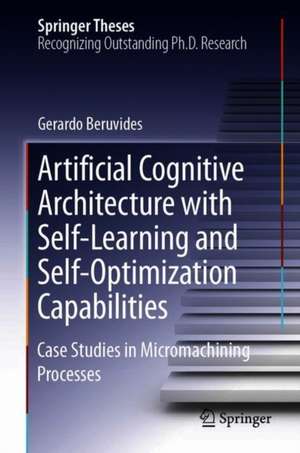Artificial Cognitive Architecture with Self-Learning and Self-Optimization Capabilities: Case Studies in Micromachining Processes: Springer Theses
Autor Gerardo Beruvidesen Limba Engleză Hardback – 31 ian 2019
Din seria Springer Theses
- 18%
 Preț: 997.88 lei
Preț: 997.88 lei -
 Preț: 389.88 lei
Preț: 389.88 lei - 15%
 Preț: 646.94 lei
Preț: 646.94 lei - 18%
 Preț: 943.43 lei
Preț: 943.43 lei -
 Preț: 399.29 lei
Preț: 399.29 lei - 18%
 Preț: 944.99 lei
Preț: 944.99 lei - 15%
 Preț: 636.80 lei
Preț: 636.80 lei - 18%
 Preț: 941.05 lei
Preț: 941.05 lei - 15%
 Preț: 643.16 lei
Preț: 643.16 lei - 15%
 Preț: 642.68 lei
Preț: 642.68 lei - 18%
 Preț: 1103.62 lei
Preț: 1103.62 lei - 20%
 Preț: 558.82 lei
Preț: 558.82 lei - 18%
 Preț: 1112.30 lei
Preț: 1112.30 lei - 18%
 Preț: 944.19 lei
Preț: 944.19 lei - 18%
 Preț: 1109.92 lei
Preț: 1109.92 lei - 18%
 Preț: 1217.27 lei
Preț: 1217.27 lei - 15%
 Preț: 640.06 lei
Preț: 640.06 lei - 15%
 Preț: 636.45 lei
Preț: 636.45 lei - 15%
 Preț: 640.06 lei
Preț: 640.06 lei - 15%
 Preț: 640.88 lei
Preț: 640.88 lei -
 Preț: 389.70 lei
Preț: 389.70 lei - 20%
 Preț: 563.89 lei
Preț: 563.89 lei -
 Preț: 393.35 lei
Preț: 393.35 lei - 15%
 Preț: 637.93 lei
Preț: 637.93 lei - 15%
 Preț: 641.85 lei
Preț: 641.85 lei - 18%
 Preț: 1225.94 lei
Preț: 1225.94 lei - 20%
 Preț: 551.36 lei
Preț: 551.36 lei - 18%
 Preț: 1229.10 lei
Preț: 1229.10 lei - 15%
 Preț: 639.25 lei
Preț: 639.25 lei - 18%
 Preț: 999.45 lei
Preț: 999.45 lei - 15%
 Preț: 640.06 lei
Preț: 640.06 lei - 18%
 Preț: 1220.45 lei
Preț: 1220.45 lei - 18%
 Preț: 1116.26 lei
Preț: 1116.26 lei - 18%
 Preț: 1110.72 lei
Preț: 1110.72 lei - 18%
 Preț: 1000.87 lei
Preț: 1000.87 lei - 18%
 Preț: 891.17 lei
Preț: 891.17 lei - 15%
 Preț: 640.06 lei
Preț: 640.06 lei - 5%
 Preț: 1154.07 lei
Preț: 1154.07 lei - 15%
 Preț: 635.96 lei
Preț: 635.96 lei - 15%
 Preț: 640.88 lei
Preț: 640.88 lei -
 Preț: 387.20 lei
Preț: 387.20 lei - 18%
 Preț: 1109.92 lei
Preț: 1109.92 lei -
 Preț: 385.25 lei
Preț: 385.25 lei -
 Preț: 385.25 lei
Preț: 385.25 lei - 18%
 Preț: 1112.30 lei
Preț: 1112.30 lei - 18%
 Preț: 999.45 lei
Preț: 999.45 lei -
 Preț: 386.99 lei
Preț: 386.99 lei - 15%
 Preț: 637.13 lei
Preț: 637.13 lei - 20%
 Preț: 554.20 lei
Preț: 554.20 lei - 20%
 Preț: 555.57 lei
Preț: 555.57 lei
Preț: 643.34 lei
Preț vechi: 756.86 lei
-15% Nou
Puncte Express: 965
Preț estimativ în valută:
123.12€ • 127.19$ • 102.47£
123.12€ • 127.19$ • 102.47£
Carte tipărită la comandă
Livrare economică 26 martie-09 aprilie
Preluare comenzi: 021 569.72.76
Specificații
ISBN-13: 9783030039486
ISBN-10: 303003948X
Pagini: 203
Ilustrații: XXIX, 195 p.
Dimensiuni: 155 x 235 mm
Greutate: 0.5 kg
Ediția:1st ed. 2019
Editura: Springer International Publishing
Colecția Springer
Seria Springer Theses
Locul publicării:Cham, Switzerland
ISBN-10: 303003948X
Pagini: 203
Ilustrații: XXIX, 195 p.
Dimensiuni: 155 x 235 mm
Greutate: 0.5 kg
Ediția:1st ed. 2019
Editura: Springer International Publishing
Colecția Springer
Seria Springer Theses
Locul publicării:Cham, Switzerland
Cuprins
Introduction.- Modeling Techniques for Micromachining Processes.- Cross Entropy Multi-Objectve Optimization Algorithm.- Artificial Cognitive Architecture Design and Implementation.
Textul de pe ultima copertă
This book introduces three key issues: (i) development of a gradient-free method to enable multi-objective self-optimization; (ii) development of a reinforcement learning strategy to carry out self-learning and finally, (iii) experimental evaluation and validation in two micromachining processes (i.e., micro-milling and micro-drilling). The computational architecture (modular, network and reconfigurable for real-time monitoring and control) takes into account the analysis of different types of sensors, processing strategies and methodologies for extracting behavior patterns from representative process’ signals. The reconfiguration capability and portability of this architecture are supported by two major levels: the cognitive level (core) and the executive level (direct data exchange with the process). At the same time, the architecture includes different operating modes that interact with the process to be monitored and/or controlled. The cognitive level includes three fundamentalmodes such as modeling, optimization and learning, which are necessary for decision-making (in the form of control signals) and for the real-time experimental characterization of complex processes. In the specific case of the micromachining processes, a series of models based on linear regression, nonlinear regression and artificial intelligence techniques were obtained. On the other hand, the executive level has a constant interaction with the process to be monitored and/or controlled. This level receives the configuration and parameterization from the cognitive level to perform the desired monitoring and control tasks.
Caracteristici
Nominated as an outstanding thesis by the Intelligent Control Group of of the Comité Español de Automática (CEA) Reports on the design and implementation of a bio-inspired artificial cognitive architecture for control purposes Merges knowledge gained in different fields, from AI to signal processing and control engineering Describes an amazing of variety of micromaching tests performed to validate the developed architecture
